The ear is an important and complex organ of the human body. By receiving sound information and transmitting it to the brain for analysis, it allows us to communicate with the environment around us. Also, part of the ear contributes to the balance of the body.
The ear is also an extremely fragile organ and we must take care of it. Damaging the ear can cause hearing loss which can lead to deafness, an irreversible consequence.
Schematic of the ear
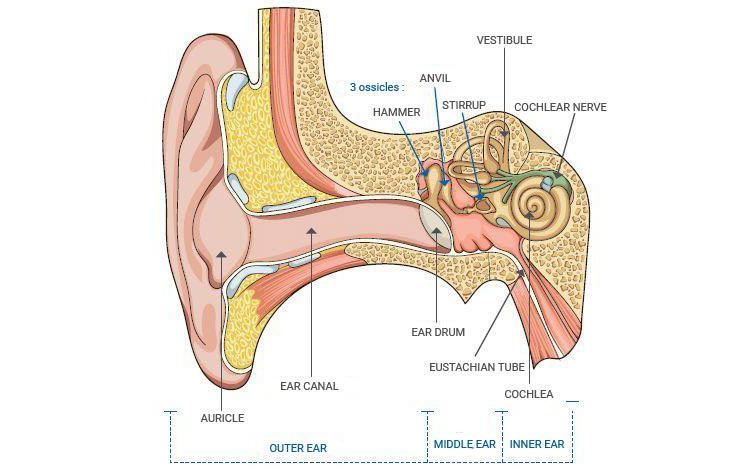
The ear is composed of 3 parts:
- The outer ear: This is the visible part of the ear (the auricle) but also comprises the ear canal up to the Tympanic membrane( Ear drum).
- The middle ear: This comprises the 3 ossicles( Malleus, Incus and Stapes) which transmit vibrations to the inner ear.
- The inner ear: This transforms sounds into nerve impulses which are then read by the brain.
The function of a healthy ear
When a sound is received by the auricle, it passes through a precise course through the three parts of the ear. During this journey, it is amplified and transformed so that it is understood by the brain.
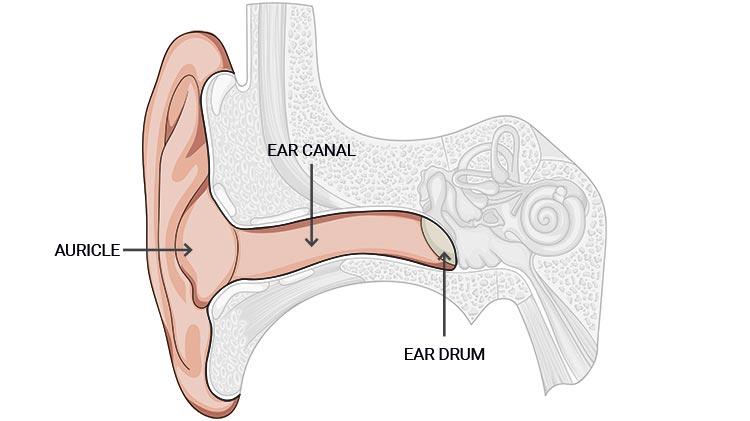
Sound is captured by the auricle and then transmitted by way of vibrations into the ear canal up to the ear drum.
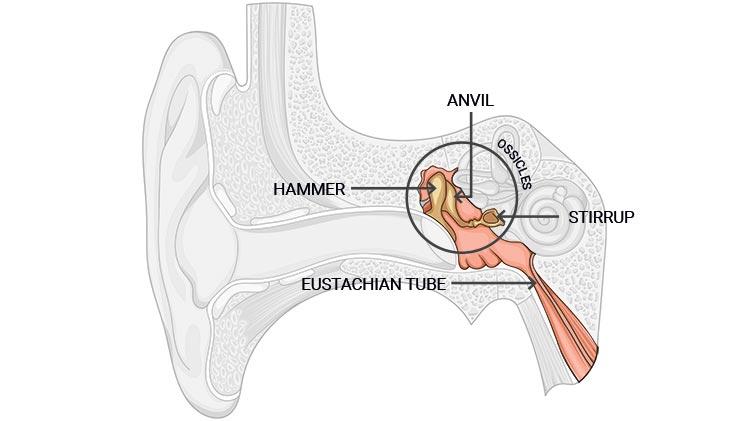
These vibrations are transmitted to the middle ear where they are amplified by the hammer, the anvil and the stirrup and transferred to the middle ear. The middle ear also serves to protect the inner ear from loud sounds, greater than 80dB.
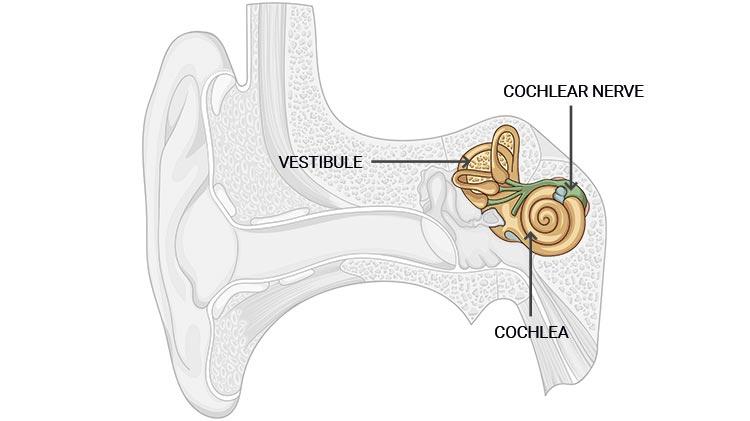
The stirrup presses on the cochlea which is in the inner ear. Inside the cochlea there are hair cells the hairs of which transform vibrations into electrical signals which are then interpreted by the brain.
How an ear with hearing loss works
The difference between the workings of an ear with hearing loss and a healthy ear is in the hair cells. These cells are very fragile and can be destroyed abruptly or gradually when subjected to significant sound intensities. The problem? They do not regenerate and can not heal nor be replaced.
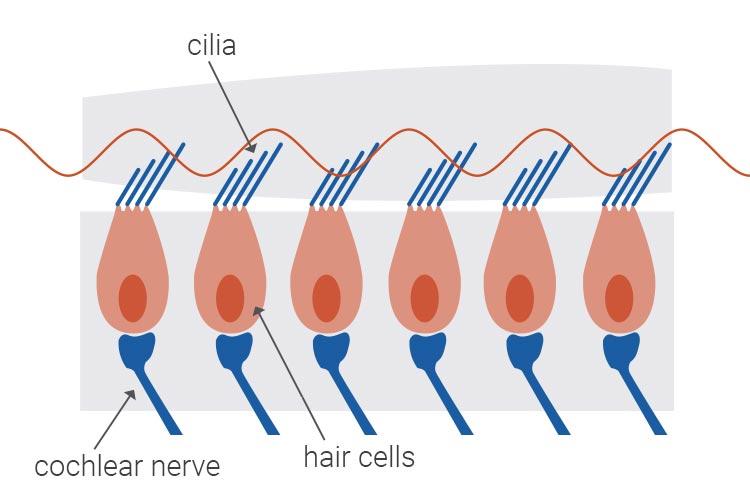
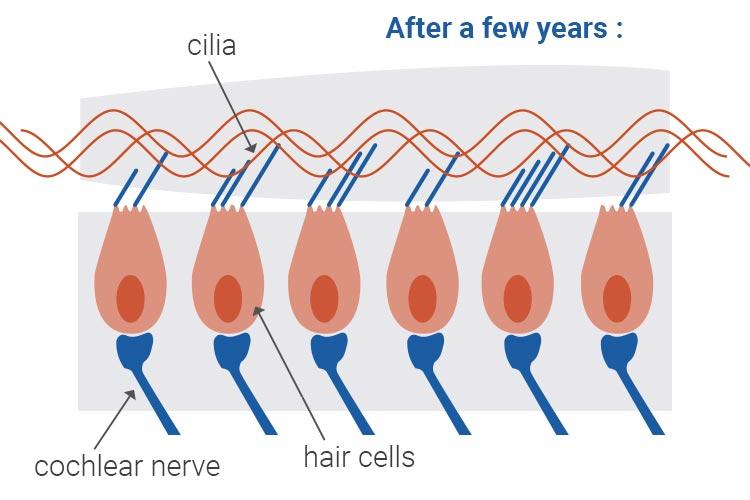
When a hair cell is damaged, the signal transmitted to the brain becomes imprecise: it becomes difficult to hear properly.
On the other hand, when the hair cell is destroyed, the transmission of the signal to the brain is prevented so we do not hear anymore. This hearing loss is irreparable.
Consequences of hearing loss
A decrease in hearing is not without consequence for its victims. Indeed, we observe different forms of disorders related to hearing loss.

Social problems
Social problems in the household of someone who hears badly translate into:
- Difficulties to communicate: Inability to understand or poor understanding of what is being said causing the speaker to repeat or to speak more loudly.
- Isolation: Someone suffering from hearing loss has a tendency to become socially introspective.
Physical problems
We can also see physical problems in those suffering reduced hearing:
- Headaches
- Hypertension
- Loss of balance
- Tinnitus or hyperacusis
Psychological problems
Psychologically, people who are hard of hearing or deaf are vulnerable and therefore may be subject to stress due to a lack of perception of the world around them and therefore feel insecure.
Generally, these people also have low morale, which is the result of lack of confidence and low self-esteem, feelings of shame, and so on. Sometimes this can lead to depression.
As a result, individuals with hearing loss may experience fatigue and a lack of appetite.
Adopt the correct approach
It's essential to adopt best practice both at work and at home in order to prevent hearing loss.
In industry

In the construction industry, there are generally high noise levels. To limit the impact of noise some good practices are required:
- Check: In order to identify the risks your need to assess noise levels at different workplaces
regularly, at least once a year. The same goes for the purchase of a new machine or a reorganization of
premises.
Depending on the sound levels, in accordance with the law:
- 80 dB (A): recommended protection (protection must be made available)
- 85 dB (A): compulsory protection
- 87 dB (A): never to be exceeded (personal worn protection) - Wear hearing protection: the wearing of an Individual Hearing Protection Device (IHPD) must be in accordance with several criteria (industry, comfort, implementation, etc.). For maximum efficiency, they must be worn 100% of the exposure to noise time and inserted and removed in a quiet place.
- Raising awareness: You must individually and collectively educate employees regularly regarding risk of noise, reminding them of the consequences of noise on the body and how to protect themselves.
In shared offices

In shared offices noise is not necessarily a danger but it can be a nuisance to some people. Such noise nuisance can lead to lack of concentration and then to lost productivity and generate stress and fatigue.
To avoid such problems, we can choose to reduce the building's noise levels by absorbent partitions or panels.
There are other possible solutions like disposable ear plugs, sound isolating head phones or made to measure noise reducing filters. One can also decide to share things that bother us with our colleagues so that everyone is aware of such issues.
At home
Noise is everywhere, even at home. Think of DIY activities (drill, hammer, electric saw, etc.) or gardening (clippers, hedge trimmers, chainsaws, etc.), when we listen to music or when we vacuum.

Again good habits can be adopted to prevent hearing loss:
- Reduce the volume: Reduce the sound level of audio ear phones so that you can always hear your surroundings. The best advice is to have your loudest volume set at about half the maximum Even then it is better to listen to music using headphones rather than in ear buds.
- Limit your exposure time: You must restrict the time spent in noise and allow your ears to rest regularly. By way of example, in a discotheque it is advised that you take a break of 10 minutes every 45 minutes or 30 minutes every two hours.
- Maintain proper hygiene: It is important to maintain good hygiene. For this we do not recommend using cotton buds as they can cause wax blockages. A little soft soap and water is sufficient.
- Wear ear protection: To protect your ears it is vital to wear anti noise protection whenever you undertake noisy activities such as mowing the lawn cutting a hedge, cutting wood...
Following best practice protects your ears and limits the risk of hearing loss.
Protecting your ears is important when you understand how they work. Many simple actions can help prevent hearing loss.
